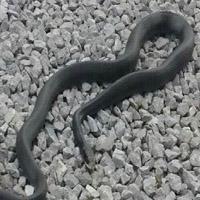North American Racer (Coluber constrictor)

- Length: 36″-60″
- Weight: 2-5 pounds
- Diet: Carnivorous, eating birds, rodents, and small animals.
- Breeding: Starts in March through May.
- Gestation: 60-90 Days.
- Reproduction: 5-36 eggs, hatchlings appearing starting in late summer or early fall.
- Habitat: Urban areas with the availability of food water and shelter, open fields, and green open spaces. Common around urban and rural fields.
- Legal Status: Common throughout North Carolina, and under no protection. It is illegal to harm, capture, or remove from the wild.
- Other Names: Black Racer, southern black racer, brown racer, blue racer, and northern black racer.
- Interesting Facts: The north american racer is one of the most common snakes found around fields and can move as fast as 5 – 7 miles per hour to escape a threat. They are excellent climbers, and commonly will lift their upper body to visually locate prey. To thwart a perceived threat, they will rattle their tail, whipping it back and forth, mimicking a rattle sound, as if a rattlesnake.
The north american racer, often referred to as the “black racer” or “blue racer”, is often found in urban and rural farm land and open fields. They are excellent climbers and extremely fast snakes. The largest threat this snake will cause, is the injury you may receive if you trip while running away, and chances are, it is faster.
As a defense mechanism, the north american racer will rattle its tail, or vibrate it fast enough to produce a rattle sound, even though not a rattlesnake. They can grow very large, as we have found them up to 5′ ft in length. They are found throughout the entire State of North Carolina. North american racers will strike repeatedly and vigorously if too close or agitated, so it is best to keep your distance. Black racers will often feed on rodents, birds, amphibians, and other small mammals and can live up to 10 years in the wild.
